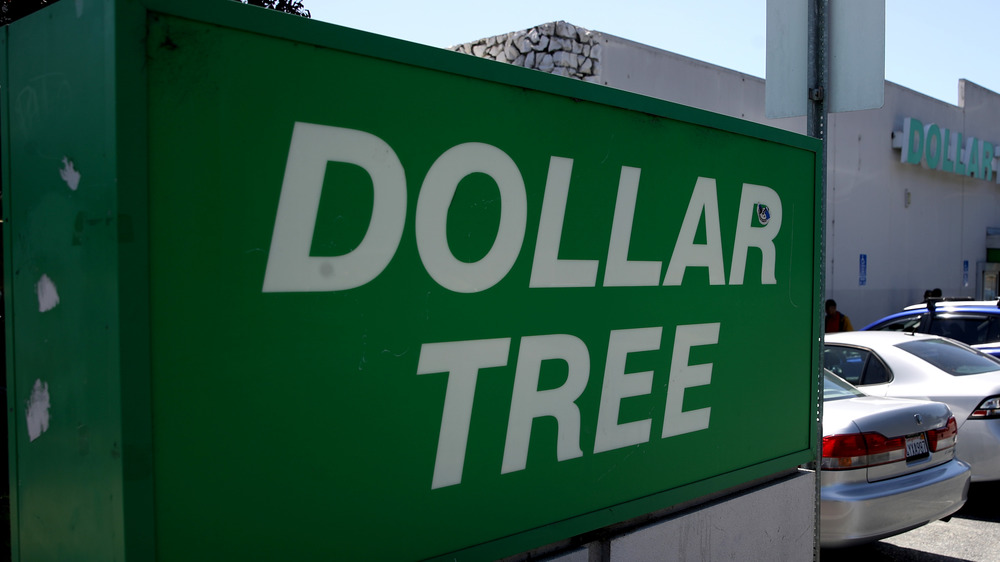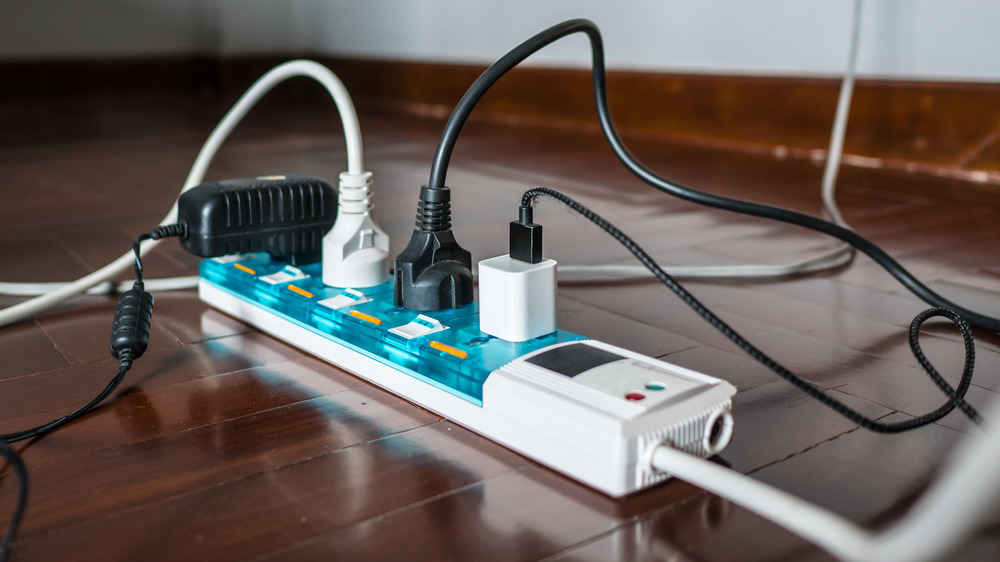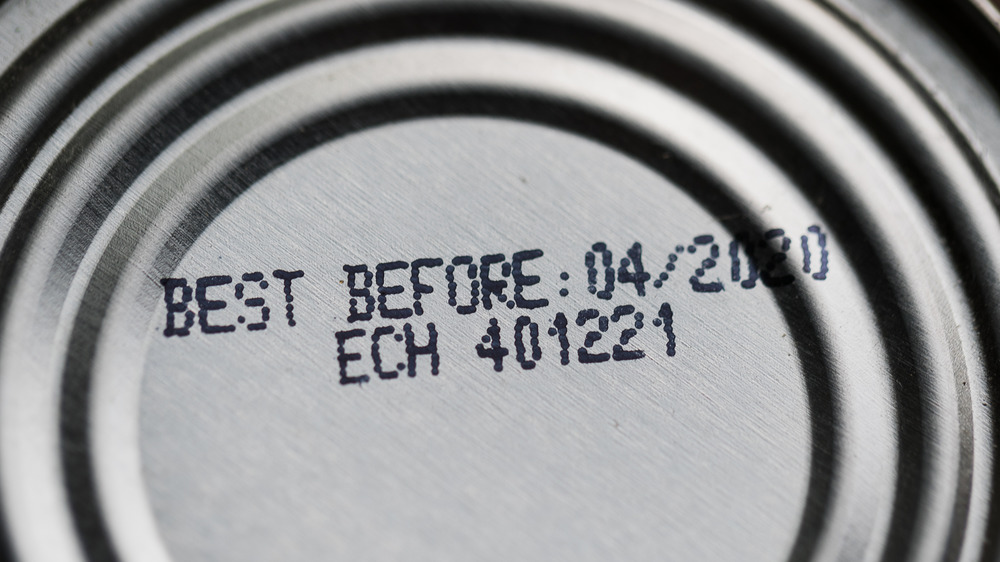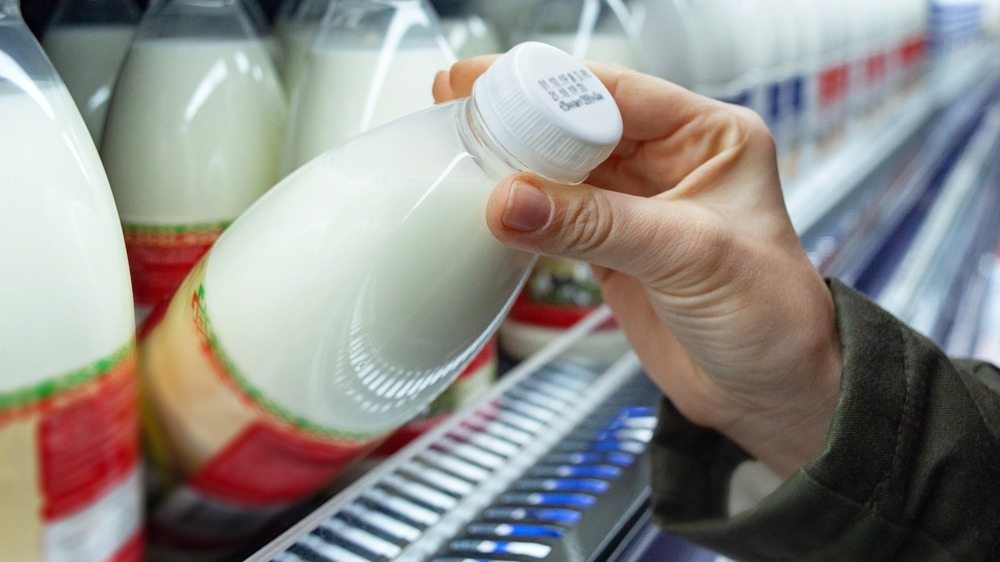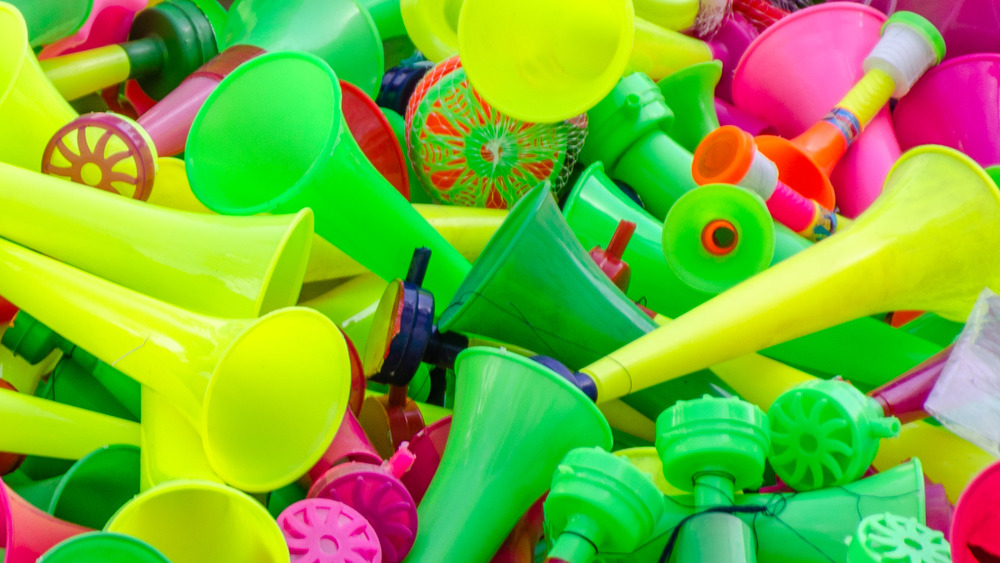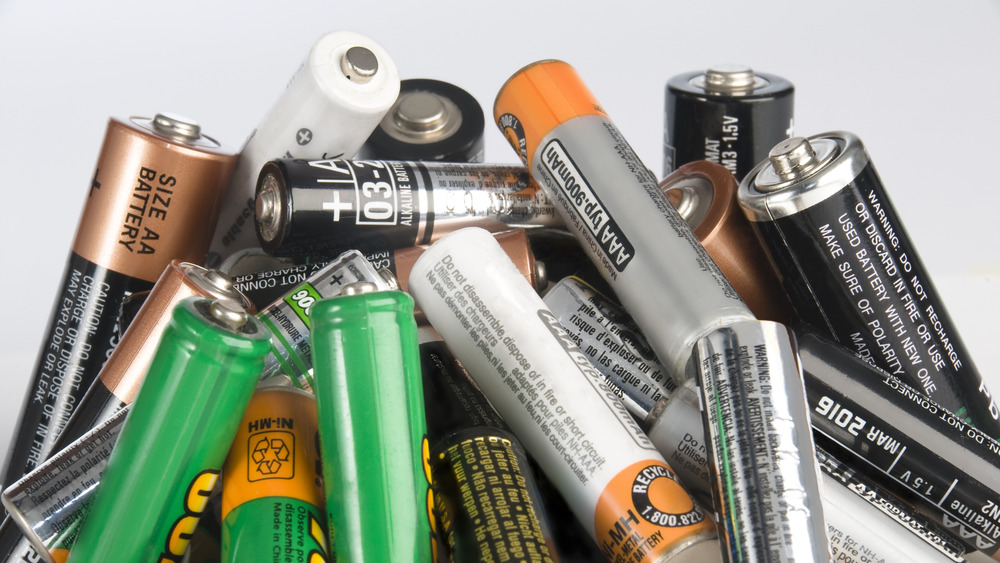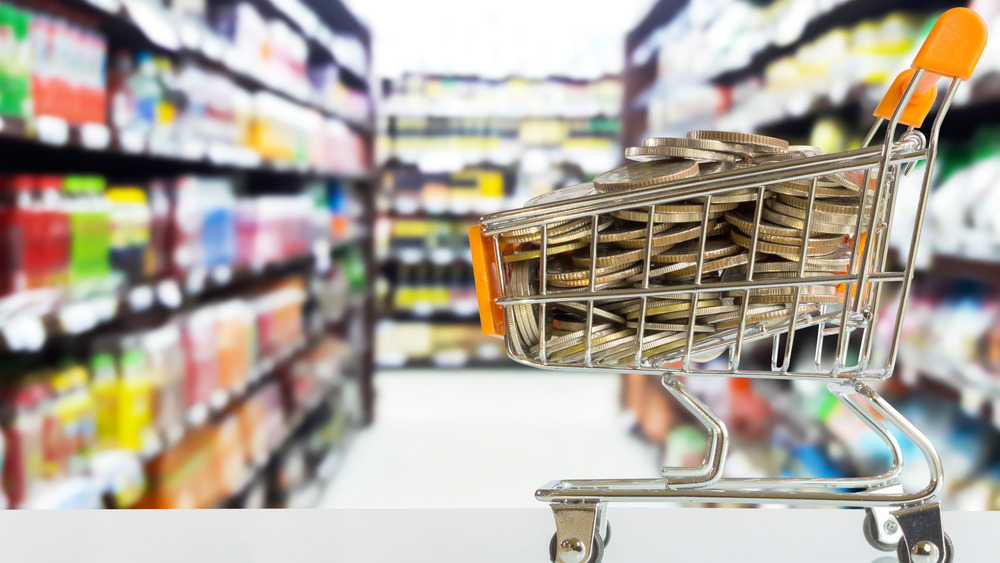Sneaky Ways Dollar Stores Try To Scam You
Dollar stores are known for their value. No matter what you're looking for, a dollar store is sure to have it. From paper goods, to children's toys, to grocery items, a quick trip through your neighborhood dollar store (and, with the number of dollar stores growing, chances are your neighborhood has at least one or more dollar stores), you're bound to find pretty much anything you might need for a steal. Heck, if you find out you're throwing a last-minute socially-distanced holiday party, a quick trip to the dollar store will afford you everything you need to decorate each person's party space. But are all dollar stores and dollar store items created equal? Hardly. If you spend even a few extra minutes looking at the products on the shelves in front of you, it's easy to see how dollar stores are using tactics to get as much money out of the consumer as possible.
Many dollar stores use simple and oftentimes under the radar tactics to scam you out of your hard-earned dollars. While some things — take paper goods, for example — are excellent deals in pretty much every dollar store, there are plenty of products (for a variety of reasons) that if you purchase, you are being scammed. From the ingredients used to when the products were made and beyond, here are the top ways dollar stores are trying to scam you.
Certain items at dollar stores may have fake labels
While you can't tell a book by its cover, you should be able to tell most other items by their labels, right? In the case of dollar stores, wrong. Take dollar store electronics, for example. Plenty of dollar store electronics — power strips, for example –— may lack a UL label (or have one that is faked), according to Consumer Reports. UL, or Underwriters Laboratories, is one of the top safety certification companies in the United States. Having a UL label on a product means that it meets or exceeds the safety standards needed for that particular item. What does it mean if this label is not there or faked? Well, smaller wiring or other parts that are not up to snuff could either just plain not work or worse, catch on fire. No one needs to see their USB charger catching on fire, especially if your lifeline to the world — your phone — is connected to the other end of the cable.
The quality of many items at dollar stores is absolutely terrible
The idiom "you get what you pay for" is no truer in any plan than in a dollar store. If you stroll down the kitchen aisle, you'd do best to just keep strolling and not buy any sort of kitchen utensils. Knives, for example, are more than likely to come dull and if you've ever spent any time in a kitchen you know — a dull knife is a dangerous knife. Not only will it not cut, but you're likely to hurt yourself in the process of attempting to slice that fruit or vegetable. The hardware aisle, too, is another to avoid in this instance. That hammer or screwdriver may be just a dollar, but both of those items are manufactured so poorly, according to a FatWallet shopping expert who talked to Go Bank Rates, that if you get more than one use out of them, you may want to consider buying a lottery ticket.
Brand name items, too, should be scrutinized. Just because you recognize the name doesn't mean that it's the same quality you know from that specific brand, according to The Street. Oftentimes those brands may have alternative products that are made with lesser parts or production values... which lead to breakage or just not working from the start.
Some dollar stores might be selling expired items
If you're going to be shopping for groceries — or really anything that could go bad after a certain period of time — then you need to check the expiration date. According to what Trae Bodge, of Splender.com, told a New York news station, dollar stores are notorious for selling close to expiration or expired goods on their shelves. Not only might a can be dented or otherwise imperfect, but there is a high chance that the food contained within is close to its expiration date. It may be that the item has been sitting there a while, or the company was able to buy a shipment of items in bulk — either way, you're going to want to check when that can of spaghetti and meatballs or that frozen dinner expire before you purchase it.
One thing you may not think about when it comes to expiration dates is sunscreen. The FDA dictates that sunscreen needs to stay at its intended strength for at least three years in order to be sold. Ingredients in the sunscreen can expire, thus becoming less effective in protecting your skin. A quick look at the bottle sitting on the dollar store shelf will tell you if spending a dollar is worth it or not.
Dollar stores sell items in differently sized packages
Quick: how much does a typical bag of flour from the grocery store weigh? Don't know the answer? Well, all you need to know is that it probably weighs more than a bag of flour at the dollar store.
Dollar stores, while selling goods for only a dollar, oftentimes have their own sized items for sale. In the case of flour, dollar store bags are usually two pounds, while a normal-sized bag at a typical grocery store or big box store weighs in at five pounds and may cost less by weight. Milk, too, is another popular culprit of the smaller size scam. You will typically get 16-ounces of milk at a dollar store for a dollar, while for only slightly more money – oftentimes only a dollar or two more – you will get 128 ounces (better known as a gallon). In other words, to get a gallon of milk at the dollar store, you'll be paying around $8 — not the deal you thought you were getting.
Some cheaply-made dollar store items may even contain hidden toxins
By now, it should come as no surprise that many items at dollar stores are cheaply made. Sure they may fall apart or breakly shortly after taking them home, but there is an additional way that dollar stores try to scam you — the materials they use are not only cheaper, but they may also be toxic, including plastic items (like children's toys). In fact, in a 2015 study done by Ecocenter, 81 percent of the 164 items tested from dollar stores contained at least one toxin, while 49 percent contained at least two toxins. Some items even contained a phthalate (DiBP) that isn't even regulated by the Committee for the Protection of Human Subjects (CPHS).
Toys and plastic goods are not the only place to possible find toxins. Remember those almost-expired cans of food? Yeah, there too. There is a high chance that the can containing the food also contains toxins. Canned goods from dollar stores have a high chance of containing Bisphenol A (BPA), which has been known to adversely affect health in large-enough amounts that it should probably be skipped.
Dollar store vitamins might not contain everything they should
If you're hoping to get your daily dose of Vitamin C or D (or heck, B12) on the cheap, you're going to want to look elsewhere. While the vitamins may not be expired (though there is always that chance), you may not be getting exactly what you think when you buy those dollar vitamins. The vitamins may not actually contain the nutrients you think they do. Or, even if they do, Consumer Reports says (via Kiplinger) that the amounts of those nutrients (or the amount that's actually absorbed by the body) might not be accurate on the label.
Basically, you could be buying a chewable chalk without any nutritional value and you may never know it (or on the other hand, you might be getting the vitamins you want or need, but you are not getting the recommended amount). You are much better off going to your local pharmacy or big box store to ensure that you are getting your daily dose of everything you need.
Batteries from the dollar store might leak and damage your electronics
You know how electronics basically run our lives these days? What if we were to tell you that, with something as small and simple as a battery, they could be ruined? It is the truth if you're planning on picking up your batteries from the dollar store.
While you may be saving a couple bucks on each package of batteries you buy, you'll be paying for it in the end if your favorite battery-powered gadget dies. Dollar store batteries, like so many other products in dollar stores, are cheaply made. They won't just break or stop working though, no, they may in fact leak, thus not only causing you to be out a dollar, but potentially hundreds of dollars if they leak inside your top-of-the-line electronics — or at the very least, cause you the inconvenience of having to order a replacement remote or part of the gadget.
Think about it: who wants to go a day or two without being able to mindlessly scroll through Netflix? It's barbaric. You'd be better off spending the few extra bucks literally anywhere else to ensure that your lifeline to the world lives to see another day the next time you need to replace its batteries.
Dollar stores may try and scam your pets, too
You are not the only one that dollar stores are trying to scam out of your hard-earned dollars. Fido, too, is in the sights of dollar stores everywhere. Like the food you might be buying to put in your body, pet food is another area where dollar stores are trying to scam you. Not only might the food be expired (sensing a trend here?), but The Washington Post says even if it is a brand name (it's more than likely not), it might be made somewhere other than the United States. What does that mean? It means that the ingredients used might not be up to the standards set here, which could mean that poor little pup could suffer in some way, shape, or form because of it. This is something to be especially cognizant of if you have an animal that has any sort of dietary restrictions. As with anything else in the dollar store, read the label before you buy.
Not everything from the dollar store is actually dollar
Despite the names of the most popular dollar stores in the country — Dollar General, Dollar Tree, and Family Dollar (which is owned by Dollar Tree) — you might be shocked to find out that not everything is actually a dollar. In fact, there are many items that are way over a dollar (especially around holiday times when gift-giving is, obviously, at an all-time high).
In an effort to appease investors (and to turn an even higher profit than they already are)it is not uncommon for dollar stores to price items above the initial dollar mark. While some stores, such as Five Below, make it known that there are items for sale that range in price, the big dollar store chains do not allude to that. It is only when you step into the store that you see endcaps or other signs advertising higher-priced goods. According to Consumer Reports, only about 25 percent of the items in any given Dollar General are under the one dollar mark.
